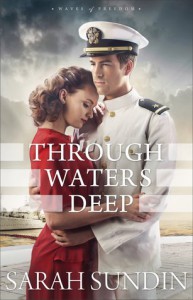

I love it when a historical romance takes on the forgotten parts to well-known history and Sarah Sundin excels at the forgotten history. This is the story of young US Navy Ensign Jim Avery is stationed in Boston on board the USS destroyer Atwood, a boat built at the Boston Naval Yards where his childhood friend Mary Stirling works as a secretary to the civilian head of the naval yard. They meet up several years after graduation when the Atwood would begin escort duties. Although Mary had a small crush on Jim in high school, he only had eyes for her best friend who happened to be the girlfriend of his best friend. So Mary kept everyone as a friend but didn't once pursue anything more from Jim. Life at the Academy and in the early days of his naval career matured Jim, who is still an easy-going guy and natural people-person. Now with those mature eyes he sees Mary in a different light but doesn't want to be seen as the goofy guy she knew in high school; his pursuit of her is slow and methodical, and doesn't seem to make a dent in her friendship with him.
Meanwhile, the war in the Atlantic is heating up and American lives are being lost long before we officially entered the war. Tensions are high at the naval yard between interventionists and isolationists and sabotage is happening with increasing frequency, putting Jim and his sailors in peril on a routine training mission. Mary is smart and has the skills and intuition to suss out the true villain. All while trying her damnest not to fall for Jim and get over her fear of public speaking/attention.
I could not put this book down! The pages flew and I just wanted more of this realistic world and the characters that inhibit it. The action scenes were intense but the characters were smart and kept their wits about them. The story takes place over the course of 1941 (starting in March and ending on December 7th) so the reader needs patience as the romance is slow building and angsty without being dark. I love how the author weaves actual history (such as the Lend-Lease agreement with Britain, the constant changes to the draft, and how lingering feelings from the Depression color some of the characters' viewpoints). It is an inspirational story, but the religious aspect is interwined with the characters and not shoe-horned in, so it feels very natural to the story. The book also passes the Bechdel test; Mary often talks to her female friends about her investigation and they help her see different angles, and Yvette (a college friend/roommate and French refugee) and Mary often speak of the war and the politics while riding the train or subway on their way to do some shopping.
One quibble I had with the story was the naval jargon, but I just skimmed most of that. Can't wait to read the other two books in the series.

